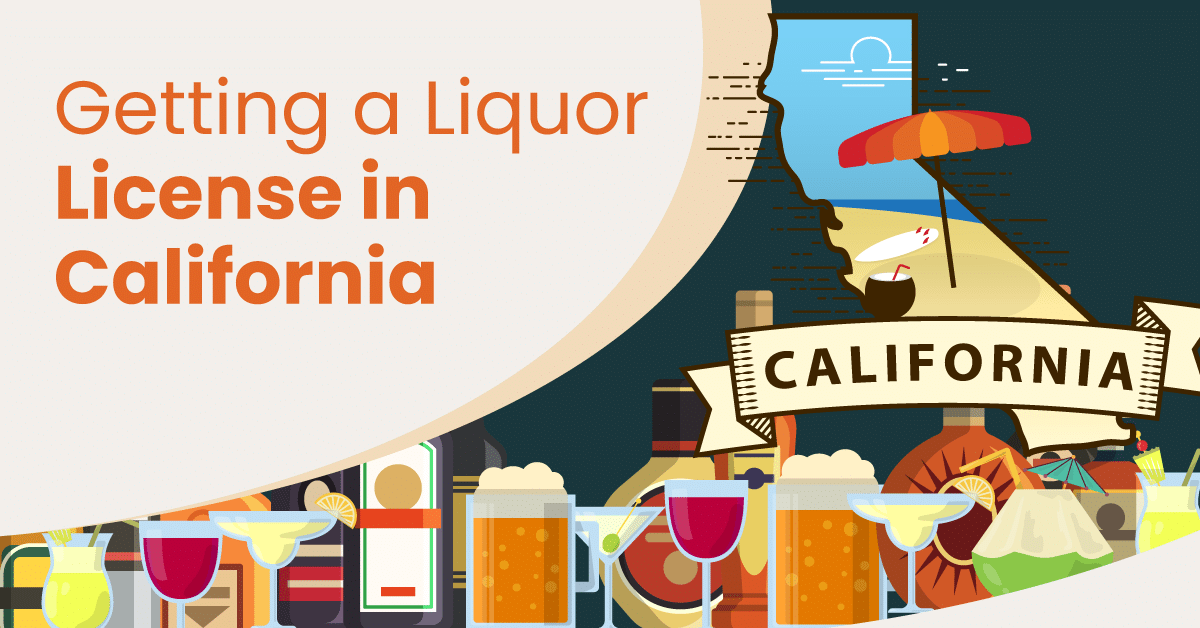Opening a liquor store, restaurant, or bar in California? Then you already know that getting a California liquor license can feel like one of the biggest hurdles. It’s easy to get overwhelmed by the paperwork, costs, and waiting times.
Here’s the good news: this guide breaks everything down — what a liquor license is, the different types available, how to apply, and how much it costs. You’ll also learn how long the process takes and how to transfer an existing license. Let’s make getting your liquor license simple.
Key Takeaways:
- A California liquor license is required to sell alcohol legally and is issued by the state’s Department of Alcoholic Beverage Control (ABC).
- License types depend on your business type, from bars and restaurants to breweries, wineries, and liquor stores.
- The application process involves determining your business type, completing forms, posting a notice, and awaiting ABC approval.
- License costs and timelines vary by license type, transfer status, and location — but expect fees from a few hundred to several thousand dollars.
What Is a California Liquor License?
A California liquor license gives a business legal permission to sell or serve alcoholic beverages. The California Department of Alcoholic Beverage Control (ABC) regulates these licenses, which vary based on the type of business, location, and kind of alcohol sold (beer, wine, or spirits).
Types of Liquor Licenses in California
California offers over 80 types of licenses — here are the most common ones for retail businesses:
Type 20 – Off-Sale Beer & Wine
For convenience stores, markets, or wine shops that sell sealed beer and wine for consumption off-premises.
Type 21 – Off-Sale General
Allows stores to sell beer, wine, and distilled spirits in sealed containers for off-premise consumption (typical for liquor stores).
Type 41 – On-Sale Beer & Wine (Eating Place)
For restaurants that sell beer and wine only for on-site consumption, as long as food service is the main business.
Type 47 – On-Sale General (Eating Place)
Allows restaurants to serve beer, wine, and distilled spirits on-site. The business must maintain a full kitchen and sell meals regularly.
What’s the Right Liquor License for You?
Your ideal license depends on how and where you plan to sell alcohol.
- Liquor stores and markets should look into Type 20 or Type 21 licenses.
- Restaurants typically need Type 41 or Type 47 licenses, depending on whether they’ll serve spirits.
- Bars or taverns might require a Type 48 license, allowing on-site sales without a food requirement.
Identifying the correct type early will help avoid costly application delays or rejections later.
How to Apply for a Liquor License in California
Step #1 – Choose the Right License Type
Review the ABC’s list of licenses and match your establishment’s needs. The difference between a Type 20 and Type 47 can determine what and where you can sell.
Step #2 – Submit an Application to the ABC
Apply directly through the California Department of Alcoholic Beverage Control. You’ll need to complete the appropriate forms and provide business and personal information.
Step #3 – Post a Public Notice
ABC requires posting a public notice at your business location for 30 days, giving the public time to raise objections if any.
Step #4 – Background Check and Investigation
The ABC investigates, verifying ownership, zoning compliance, and community impact before approval.
Step #5 – Pay Fees and Await Approval
Once your application passes inspection, you’ll pay the license fee and receive final approval.
🔗 What Are Alcohol Control States?
🔗 How to Start a Liquor Store
🔗 How to Start a Wine Shop
Cost of a Liquor License in California
Liquor license costs in California vary by type, location, and whether you’re applying for a new or transferred license.
License Type | What it Covers | Where Alcohol Can Be Consumed | Average Initial Cost (USD) | Renewal Fee (Approx.) |
Type 20: Off-Sale Beer & Wine | Sales of sealed beer and wine only (no spirits). Common for grocery, convenience, and wine stores | Off-premises only | $400 – $600 | $200 – $300/year |
Type 21: Off-Sale General | Allows sales of beer, wine, and distilled spirits, in sealed containers. Standard for liquor stores | Off-premises only | $12,000 – $16,000 (varies by county and availability) | $800 – $1,000/year |
Type 41: On-Sale Beer & Wine (Eating Place) | Authorizes restaurants to sell beer and wine for on-site consumption with meals | On-premises (must serve food) | $400 – $650 | $200 – $400/year |
Type 47: On-Sale General Eating | Permits restaurants with full kitchens to sell beer, wine, and spirits for on-site consumption | On-premises (must serve fod) | $12,000 – $15,000 (varies by location) | $1,000 – $1,200/year |
Can I Transfer a Liquor License in California?
Yes, you can transfer a liquor license from one owner to another. This can save time and reduce costs but still requires ABC approval and background checks. Transfers are common when purchasing an existing liquor store or restaurant.
Getting a Liquor License in California: How Long Does the Process Take?
Most applications take 60 to 90 days to process, depending on investigations, zoning issues, and any public protests. Transfers may be faster if no complications arise.
Simplify Your Liquor Store Operations and Save Money With KORONA POS
Running a liquor store in California comes with enough red tape — managing sales shouldn’t add to it. KORONA POS helps streamline compliance, manage age verification, and track inventory in real time. Plus, it integrates seamlessly with your payment systems and scales with your business.
Get started today and see how KORONA POS can help you save time, reduce costs, and boost your store’s efficiency.
KORONA POS is very user-friendly. You can customize the interface to suit your business needs. Customer Service is in the United States, always accessible, and always awesome. We love that we can fit it into our business scale and grow with it.
-Darlene P.
FAQs: How to Get a Liquor License in California?
How hard is it to get a liquor license in California?
It can be challenging, especially in areas with limited license quotas or community opposition. But with the right preparation, most applicants are approved within 2–3 months.
What is a Type 47 liquor license in California?
A Type 47 license allows restaurants to serve beer, wine, and distilled spirits for on-site consumption, as long as they operate a full kitchen and sell meals regularly.












